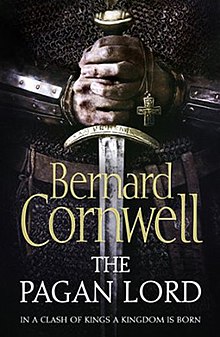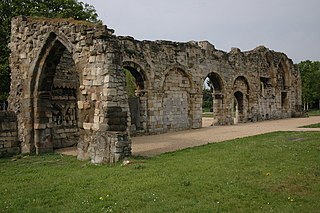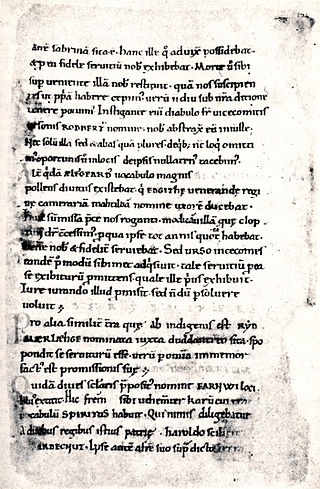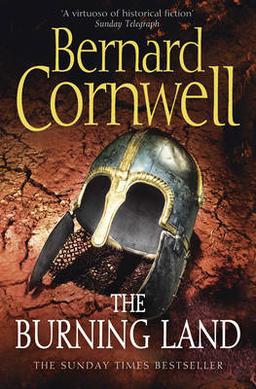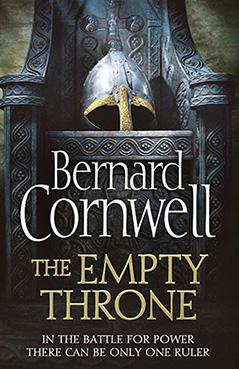Plot summary
There have been ten years of relative peace on the island of Britain between the Saxons and the Danes.
Uhtred disowns his elder son Uhtred because he has just taken vows to become a Christian priest. He renames his elder son Father Judas, and then bestows the name Uhtred on his younger, 19-year-old son Osbert. Abbot Wihtred strikes Uhtred in anger, whereupon Uhtred grabs a staff and unintentionally kills him. As a result, nearly all of Uhtred's Christian warriors leave him. Aethelflaed, Queen of Mercia and Uhtred's lover, takes these men into her service.
Reaching home, Uhtred discovers that Cnut Longsword burned down his hall because he mistakenly believed Uhtred had taken his wife and children. He manages to convince Cnut that he is innocent. Returning home, Uhtred finds all his outbuildings burnt, this time by Bishop Wulfheard. He has nothing to rebuild and a shrunken force. He decides to try to reclaim his inheritance, the fortress at Bebbanburg in Northumbria, held by his uncle Aelfric. Aelfric stole the fortress from Uhtred after Uhtred's father was killed by the Danes forty years earlier. His uncle had tried and failed to kill Uhtred; then he had him sold into slavery. They kill some of his uncle's men and succeed in entering through the first gate, masquerading as the dead men, but are detected too soon, trapped and outnumbered. While Uhtred confronts his cousin, also named Uhtred, Finan, Uhtred's second in command, takes captive the uncle, cousin Uhtred's wife Ingulfrid and her 11-year-old son (also named Uhtred). Uhtred kills his uncle and uses the wife and son of his cousin as hostages to leave. They sail to Frisia to rest and refit.
Uhtred figures out that Cnut is readying for war, after ten years of relative peace. Cnut's wife and children had not been kidnapped; it was part of Cnut's ruse to persuade Aethelred, Aethelflaed’s despised husband, into believing that Cnut would be preoccupied with an enemy, encouraging Aethelred to attack East Anglia, a Danish-held area that is also Christian. Cnut then invades Mercia. Uhtred sails to the east coast of Britain. He proceeds to Bearddan Igge (Bardney Abbey), where the Mercians have been searching for some of the bones of St. Oswald. Mercian priests say that if all of Oswald's bones can be brought back together, it will be a sign that Wessex and Mercia can defeat the Danes. Uhtred plants an anonymous partial skeleton for them to find.
Uhtred takes his men to Ceaster (Chester) and defeats the men guarding Cnut's family. He captures Cnut's wife and two children. When the children see a priest, they mistakenly greet him as Uncle (Abbot) Wihtred, so Uhtred realizes the abbot he killed was Cnut's man.
Uhtred threatens to kill his captives to force a Danish force to raise its siege of Glaewecestre (Gloucester). Inside Glaewecestre, he finds Osferth, Aethelflaed, and the bishop who burned Uhtred's barns. Uhtred sets fire to all of Cnut's boats but one, which Osferth takes to reach King Edward.
Uhtred buys time by tricking Cnut into believing that he killed Cnut's daughter. Enraged, Cnut pursues Uhtred and his greatly outnumbered band. Uhtred hopes that the time Cnut wastes will enable Edward to bring his army.
At Teotanheale (Tettenhall), Uhtred awaits Cnut's attack. Before the battle, Uhtred gives Cnut his wife and daughter back, keeping the son. Although Uhtred uses his wiles to kill some of Cnut's men (despite being grossly outnumbered), he is on the verge of defeat when Father Judas, his disowned son, brings Father Pyrlig and a few hundred Welsh warriors to reinforce him. Then Cnut and Uhtred fight. Uhtred injures Cnut, but Cnut is carried away by his men. Uhtred's son slays Cnut's main ally, Sigurd Thorsen. Then King Edward arrives with his men and the Mercians. The Danes break and the Saxons have the victory. Word is that Aethelred was badly wounded, but still lives. Cnut comes back for a one-on-one fight with Uhtred. Uhtred kills Cnut, though he is grievously wounded himself, nearly to the point of death. But he lives.
Reviews
Kirkus Reviews says the narrative meanders: "The death of Alfred the Great leaves what we know as England up for grabs, and Lord Uhtred of Bebbanburg (Death of Kings, 2012, etc.) is caught in the middle of it all. ... The big set pieces are more impressive than the realistically meandering odyssey that threads them together. The most consistent motif is Uhtred’s undying and principled hostility to “the nailed god” of Christianity and the threat he represents to the warrior code Uhtred so perfectly embodies." [1]
Publishers Weekly finds that Cornwell brings an important era in British history to light:
In Cornwell's (1356) latest, 10th century Britain is a splintered land, populated by pagans and Christians and divided between Saxons and Danes. The pagan Uhtred, once favored by Alfred the Great, finds himself distrusted by Alfred's successor, Edward, and at odds with the Christians. Made an outlaw by an ill-considered violent act, he heads north to recapture his old home, the fortress of Bebbanburg; though his grand scheme is less bold than foolhardy. It sets Uhtred on the path to play a crucial role in the coming war between Cnut's Danes and Edward's Saxons. For Uhtred the stakes are personal glory and vengeance against those who wronged him, but the fate of Britain itself hangs on the unforeseeable consequences of his actions. Cornwell successfully brings an unjustly obscure era in British history to life, showing how grand events can be shaped by what are essentially petty motivations. Cornwell skillfully illuminates the competing cultures of the 10th Century; the conflict between Dane and Saxon is examined with sympathy and insight—without projecting 21st century values onto cultures now alien to us. In the course of this, he shows how historical novels should be written. (Jan.) [2]
